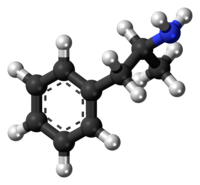
Photo from wikipedia
Amphetamine and methylphenidate are known to have stimulatory effect in healthy subjects but not in humans with attention deficit hyperactivity disorder and in rodents with impaired dopamine transporter (DAT) function.… Click to show full abstract
Amphetamine and methylphenidate are known to have stimulatory effect in healthy subjects but not in humans with attention deficit hyperactivity disorder and in rodents with impaired dopamine transporter (DAT) function. This phenomenon is called the paradoxical calming effect of psychostimulants. It has been previously demonstrated that psychostimulants may regulate the enzymatic activity of tyrosine hydroxylase (TH). Hence, the objective of the present study was to determine whether the lack of activity-stimulating effects of amphetamine in hyperactive rats is associated with changes in TH activity. To model hyperactivity in rats, acute administration of DAT inhibitor GBR12909 was used. Changes in TH activity, assessed as L-DOPA accumulation and TH phosphorylation levels, were measured in amphetamine treated rats with or without pretreatment with GBR12909. Our results showed that amphetamine treatment alone increased locomotor activity in rats, whereas pretreatment of rats with GBR12909 counteracted this effect, a finding consistent with the paradoxical calming effect. GBR12909, while having no effect on its own, blocked amphetamine-induced elevation of TH activity in dorsal striatum and nucleus accumbens, measured as increased tissue L-DOPA concentration. However, the phosphorylation levels of TH were not affected by treatment with amphetamine, GBR12909 or the combination of both. Our findings indicate that other mechanisms than phosphorylation-regulated TH activity changes are responsible for the paradoxical calming effect of amphetamine under conditions of impaired DAT activity.
Journal Title: Behavioural Brain Research
Year Published: 2017
Link to full text (if available)
Share on Social Media: Sign Up to like & get
recommendations!